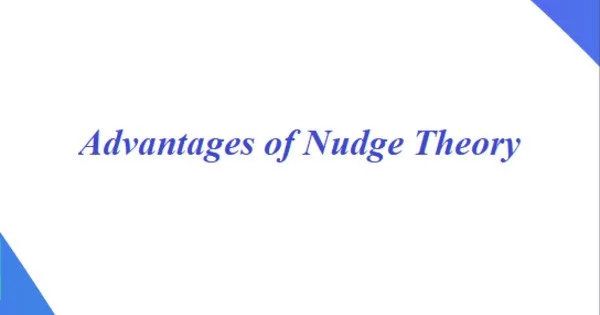A nudge in the workplace can simply help your employees make better decisions faster. Increasing the effectiveness of positive change. As a result, your team may have higher levels of employee engagement, employee wellbeing, and better employee relations, all of which contribute to a healthier work environment.
This framework’s primary function is to assist people in making better decisions that result in desirable outcomes. Many of the decisions we make on a daily basis involve a choice between two options, such as whether to eat something healthy or something unhealthy, whether to join a pension scheme or not, whether to become an organ donor or not, and so on.
A nudge should aim to improve the workplace and help your team create positive change overall. With a successful rewards and recognition scheme, you could promote your team’s wellbeing, productivity and growth.
Advantages of Nudge theory
(1) Better outcomes for individuals
The first and perhaps most obvious advantage of nudging is that it can help people make healthier and wealthier choices. For example, a government could increase the number of people who sign up for pension plans by instituting a system that forces people to opt out of these plans after starting a new job, rather than opting in. This opt-out system could result in far more people receiving pensions after they retire, improving their quality of life and financial security in the long run.
Similarly, banks and financial services could use nudging to encourage their customers to open savings accounts and save money. For instance, by asking them to commit to transferring a certain percentage of their salary to their savings every month.
Nudging can also be used to promote healthier lifestyle choices, such as placing fruits, vegetables, and other healthy foods on shelves that are easier to reach, or offering gym memberships along with other related purchases.
(2) Better outcomes for society
In addition to improving individual choices, nudging can have a positive impact on society. For example, it could be used to encourage more people to become organ donors, thereby shortening the waiting list for people in need of organ transplants and thus saving more lives.
The UK government recently changed from an opt-in to an opt-out system for organ donation, which has already been implemented in Argentina, Brazil, Austria, Belgium, Spain, and other countries. Opt-out programs have been shown to increase organ donations by 20% to 80% on average.
(3) Informing and empowering people
In some cases, nudging can also be an extremely effective method of informing people about the risks associated with specific choices or behaviors, thereby improving their decision-making. A good example of this was when nudging was used to combat rising antimicrobial resistance as a result of antibiotic abuse and over-prescription.
The National Health Service (NHS) of the United Kingdom (UK) began testing the use of nudges to reduce the use of antibiotics and other drugs that can have long-term negative effects. More specifically, letters were sent to some General Practitioners informing them that they were prescribing antibiotics at a higher rate than their peers. The implicit social pressure of highlighting the fact that they were acting differently than their peers resulted in a significant reduction in their over-prescribing.
Following the introduction of the COVID-19 vaccine, some governments used nudging to increase vaccination rates. This included sending out reminders or informing people about the vaccine’s benefits via the voices of healthcare workers or other expert speakers.
Some messages were chosen to come from people who were representative of an individual’s own community, who were similar to them, and with whom they could directly empathize. When making decisions, these various elements of expertise and similarity in the messenger help to reassure and encourage people.
















